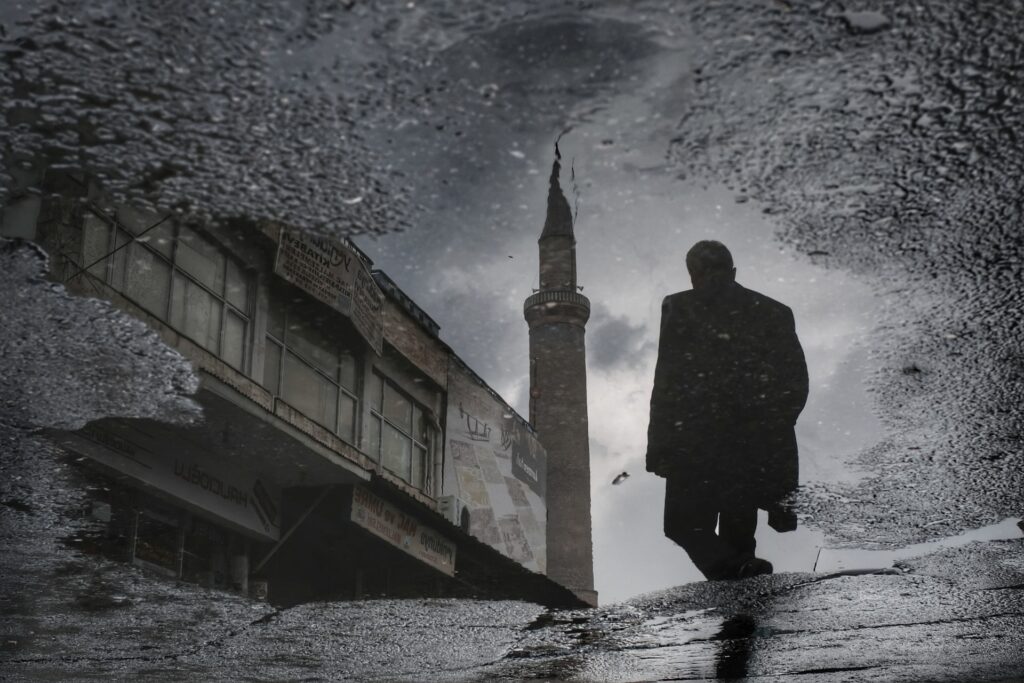The last two verses of Surah al-Baqarah have special status:
“The Messenger believes in what has been sent down to him from his Lord, as so do the faithful. They all believe in Allah, His angels, His scriptures, and His messengers. ‘We make no distinction between any of His messengers,’ they say, ‘We hear and we obey. Grant us Your forgiveness, our Lord. To You we all return!’
Allah does not burden any soul with more than it can bear: each gains whatever good it has done, and suffers its bad —’Lord, do not burden us to task if we forget or make mistakes. Lord, do not burden us as You burdened those before us. Lord, do not burden us with more than we have strength to bear. Pardon us, forgive us, and have mercy on us. You are our protector, so help us against the disbelievers.’ [Quran 2:285-286]
These verses contain the creed of Islam.
They also show our attitude towards Allah’s commands.
And finally, they give us one of the most blessed dua (supplication) to lift our burdens.
The Attitude of a Muslim: What the Conclusion of al-Baqarah Reveals

A hadith in Sahih Muslim tells the context of the revelation of the last two verses of Surah al-Baqarah.
First, this verse came down:
“Whatever is in the heavens and in the earth belongs to Allah and, whether you reveal or conceal your thoughts, Allah will call you to account for them. He will forgive whoever He will and punish whoever He will: He has power over all things.” [Quran 2:284]
The Companions of the Messenger of Allah (ﷺ) felt it hard and severe and they came to the Messenger of Allah (ﷺ) and sat down on their knees and said:
Messenger of Allah, we were assigned some duties which were within our power to perform, such as prayer, fasting, struggling (in the cause of Allah), charity. Then this verse was revealed unto you and it is beyond our power to live up to it.
The Messenger of Allah (ﷺ) said:
Do you intend to say what the people of the two books (Jews and Christians) said before you:” We hear and disobey”? You should rather say: “We hear and we obey. Grant us Your forgiveness, our Lord. To You we all return!”
When the people recited it and it smoothly flowed on their tongues, then Allah revealed immediately afterward the ending of Surah al-Baqarah.
Obedience doesn’t happen without listening.
Once we have listened and obeyed, we ask for forgiveness.
This sequence is curious.
Normally, we ask for forgiveness when we disobey, not after obeying!
The reason is we spent time not listening, neither obeying. And that requires forgiveness.
Allah Knows Our Potential

“Allah does not burden any soul with more than it can bear: each gains whatever good it has done, and suffers its bad.”
What if Allah’s command is too difficult to obey?
Allah’s reply is:
“Allah does not burden any soul with more than it can bear.”
We can see this in two ways.
The first one concerns religious duties.
Any individual has the capacity to fulfill them.
Otherwise, Allah wouldn’t give us responsibilities we can’t handle.
The second one concerns our personal challenges.
The Quran emphasizes our uniqueness and individuality.
It means my burden and challenges will be different from yours.
We all have our own predisposition, capacity, and potential.
And Allah will test us in the proportion to what has been given to us (strength, opportunities, wealth…)
In other words, an individual can’t bear the burden of another.
As Allah said:
“No soul shall bear the burden of another; that man will only have what he has worked towards; that his labor will be seen, and that in the end he will be repaid in full for it.” [Quran 53:38-41]
So we know whatever challenge we’re going through, Allah gave us enough to deal with.
We are all in a race against ourselves.
To help us, Allah made the doors to earning good easy, and He made the doors of earning bad hard.
Exclusive Gifts to Muslims

“They all believe in Allah, His angels, His scriptures, and His messengers. ‘We make no distinction between any of His messengers.'”
Islam didn’t start with Muhammad (ﷺ) but completed by him.
All the messengers came to help us take the journey of surrendering to Allah.
It’s impossible for a Muslim to not believe in previous messengers.
The Quran is filled with messages and stories from previous prophets.
The building of Islam was a collective work as the Messenger of Allah (ﷺ) said:
“Verily, the parable of myself and the Prophets before me is that of a man who built a house, perfected it, and beautified it, except for the place of one brick at its cornerstone. The people walk around it and are amazed by it, and they say: Why is this brick not placed? Thus, I am the brick and I am the seal of the Prophets.” [Bukhari & Muslim]
This last brick came with exclusive gifts to Muslims.
Two of them are exposed in this hadith:
While Gabriel was sitting with the Prophet (ﷺ), he heard a creaking sound above him. He lifted his head and said:
This is a gate opened in heaven today which had never been opened before. Then when an angel descended through it, he said: This is an angel who came down to the earth who had never come down before. He greeted and said:
“Rejoice in two lights given to you which have not been given to any prophet before you: Surat Al-Fatihah and the concluding verses of Surah Al-Baqarah. You will never recite a word from them without being given the blessings it contains.” [Muslim]
Three Types of Burden
“Lord, do not burden us to task if we forget or make mistakes. Lord, do not burden us as You burdened those before us. Lord, do not burden us with more than we have strength to bear.”
Have you noticed something about the burdens?
They are gradually increasing in difficulty and intensity.
First Burden

The first burden is related to forgetfulness and making mistakes.
Forgetting is not a small deal:
“We also commanded Adam before you, but he forgot and We found him lacking consistency.” [Quran 20:115]
Adam was sent down to earth because he forgot.
This is not the worst outcome. At least, Adam (AS) was reminded of his forgetfulness and corrected his mistake.
What about the actions will have no opportunity to correct:
“On the day when Allah will raise everyone and make them aware of what they have done. Allah has taken account of it all, though they may have forgotten: He witnesses everything.” [Quran 58:6]
So forgetfulness is a big deal. And we are invited to do our best not to make it happen.
Second Burden

However, we move to the following burden when:
- We keep forgetting and making mistakes
- Not living up to our responsibilities
This is the burden of people who say we hear and we disobey.
A great example is the story of the Israelites.
They had all kinds of burdens.
1- Religion became complicated:
“Who relieves them of their burdens and the iron collars that were on them.” [Quran 7:157]
2-They broke into groups that hate each other:
“[He has power] to divide you into discordant factions and make some taste the violence of others. See how We explain Our revelation in various ways, so that they may understand.” [Quran 6:65]
3-Faith had no more effect on the hearts:
“They say, ‘Our hearts are impenetrably wrapped [against whatever you say],’ but Allah has rejected them for their disbelief: they have little faith.” [Quran 2:88]
Third Burden

When nothing works to bring us back to the path, we get what we have no power to deal with.
History has plenty of examples of this type of burden:
“The people of Thamud and ‘Ad denied that crashing blow would come: Thamud was destroyed by a deafening blast; ‘Ad was destroyed by a furious wind that God let loose against them for seven consecutive nights, eight consecutive days, so that you could have seen its people lying dead like hollow palm-trunks. Can you see any trace of them now? Pharaoh, too, and those before him, and the ruined cities: these people committed grave sins and disobeyed the messenger of their Lord, so He seized them with an ever-tightening grip.” [Quran 69:4-9]
To this day, we can see remains of powerful civilizations that, despite their technological advancement, they couldn’t save themselves.
Final Thoughts on the Conclusion of Surah al-Baqarah

“Pardon us, forgive us, and have mercy on us.”
This sequence is not random.
Pardon is for the wrong we do to our personal relationship with Allah.
Forgiveness is for the wrong we do to others.
And mercy is for our future actions. We ask Allah for guidance so we do more of what is beneficial.
We ask Him to keep us in His protection so we don’t fall into mistakes in the first place.
It is good to memorize the last two verses of Surah al-Baqarah as many narrations highlight their special status.
In one of them, it says:
“I was given these last verses of Surah al-Baqarah from a treasure under the Throne. None before me has been given them, and none after me will be given them.” [An-Nasaa’i]
In another one, the Prophet (ﷺ) said:
“If one recites the last two verses of Surah al-Baqarah at night, it is sufficient for him (for that night).” [Bukhari]
So don’t forget to end up your nights with a treasure from under the throne.
Article posted the 9 November 2021
Popular Articles
- Allah According to Allah: The Beauty Behind the Verse of Light
- 7 Lessons from Luqman that Will Make You Wise
- How to Enjoy Salat and Make it Meaningful
- Are Muslims Meant to Be Sleep Deprived?
- For or Against Vaccines? That’s Not Really the Question
- Islamic Psychology: A Model Where Faith Has Its Place
- Blindness: From the Invisible Gorilla to the Quranic Perspective
- Muslims’ Unity: A Powerful Solution That Takes Its Time
- The Certainties of Muslims in Uncertain World
- Mongols Invasions: Some Forgotten Lessons to Today’s Muslims
- How to Make People Change their Mind: Persuasion!
- A Few Thoughts For Muslims
- How to Honor the Prophet?
- Muslims Judging Each Other: Why and How to Be Less Judgy
